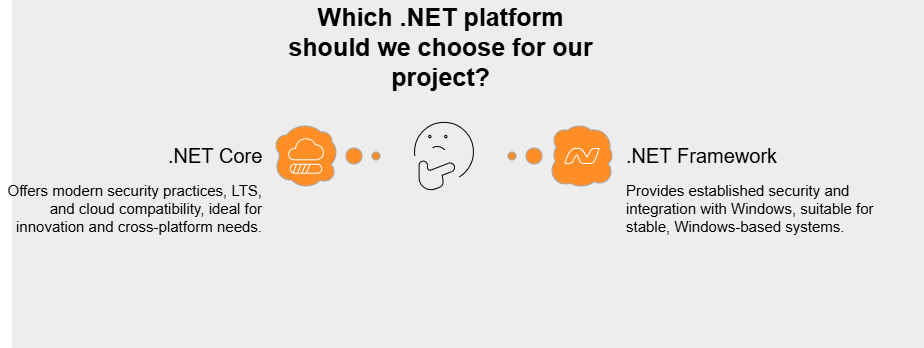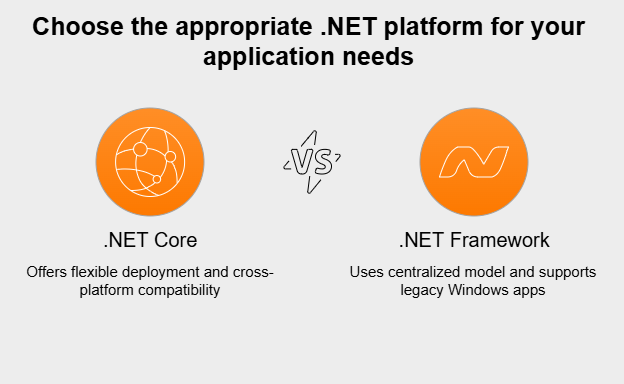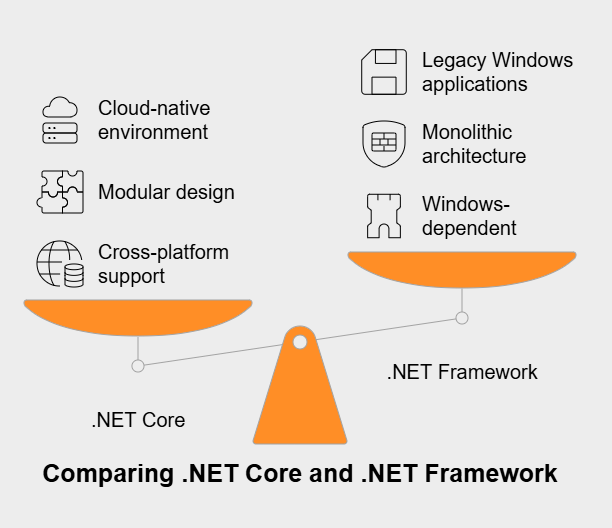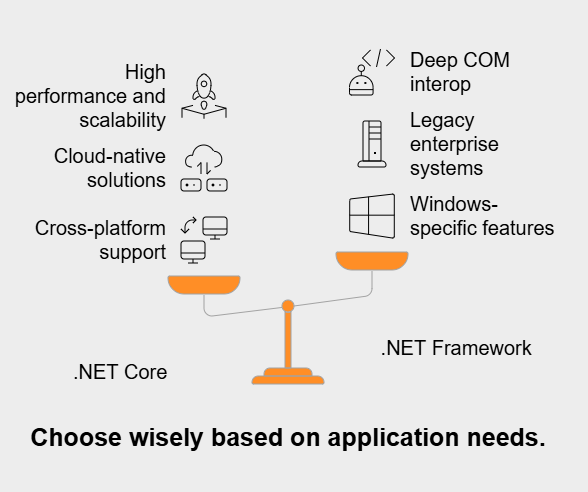11 DevOps Maturity Assessment Questions to Ask During the Audit
- April 02
- 6 min

.NET Core (now simply part of .NET) and the legacy .NET Framework are distinct Microsoft development platforms. .NET Core is open-source and runs across Windows, Linux, and macOS, making it ideal for modern cloud applications and microservices. In contrast, the .NET Framework targets primarily Windows-based software.
Understanding their architectural, compatibility, performance, and scalability differences is key for developers selecting the right tool for their project.
.NET Core (evolving into modern .NET versions like .NET 6, 7, 8+) is a cross-platform, open-source framework built for today’s cloud-centric world. Its modular design and high performance suit scalable web apps and microservices running on Windows, Linux, or macOS.
.NET Framework is the original Windows-dependent software framework. It includes extensive libraries like Windows Forms and WPF for building rich desktop UIs. Its monolithic architecture integrates deeply with the Windows OS.
While both support languages like C# and VB.NET, their deployment targets differ. .NET Core’s lightweight nature thrives in cloud-native environments, whereas .NET Framework remains relevant for legacy Windows enterprise applications.

.NET Core employs a modular architecture, letting developers include only necessary components. This minimizes overhead and boosts performance, especially for microservices and cloud computing. Its streamlined build uses resources efficiently, aiding scalability.
Conversely, the .NET Framework has a monolithic structure; the entire framework installation is typically required. This increases memory footprint and reduces flexibility compared to .NET Core, making it less optimized for modern cloud workloads.
.NET Core benefits from advanced runtime optimizations like improved Just-In-Time (JIT) compilation and Ahead-of-Time (AOT) support, speeding up execution. Enhanced asynchronous programming patterns also improve web application responsiveness—advantages largely absent in the older .NET Framework.
For scalability, .NET Core readily supports containerization via Docker and orchestration with Kubernetes, fitting distributed systems better than the more centralized .NET Framework. This makes .NET Core a strong choice for high-performance, cross-platform enterprise solutions.
.NET Core offers flexible deployment options. Applications can be self-contained, bundling their runtime and dependencies, allowing different app versions to run side-by-side without conflict across Windows, Linux, and macOS. Releases are independent of system-wide updates.
The .NET Framework uses a centralized model, installed as part of Windows and updated via Windows Update. Applications share the installed runtime, which can lead to compatibility issues if different apps require different framework versions.

.NET Core ensures cross-platform compatibility through APIs defined in .NET Standard (and its successors). While .NET Framework supports backward compatibility within its Windows ecosystem, it lacks native cross-platform reach. These differences make .NET Core better suited for modern cloud and containerized deployments, while .NET Framework remains necessary for many legacy Windows applications.
.NET Core is purpose-built for microservices and cloud applications, leveraging its cross-platform nature and modularity. Developers can easily containerize services with Docker and manage them using Kubernetes. Its native support for building RESTful APIs simplifies communication in distributed systems, making it ideal for cloud-native architectures.
The .NET Framework wasn’t designed for microservices but can interact with REST APIs. It’s more aligned with traditional Windows hosting environments rather than modern, scalable cloud infrastructure.
For cloud deployments, .NET Core integrates smoothly with serverless platforms like Azure Functions and AWS Lambda. Its Linux container compatibility boosts scalability and cost-efficiency, positioning it as the preferred choice for modernizing applications.

Choose .NET Core (modern .NET) for applications needing cross-platform support, high performance, and scalability. It excels in cloud-native solutions, microservices, APIs, and containerized deployments (Docker/Kubernetes). It’s also the foundation for serverless computing via Azure Functions or AWS Lambda.
Stick with .NET Framework for existing applications heavily reliant on Windows-specific features (like Windows Forms, WPF, WCF server implementations, or deep COM interop) or older technologies not available in .NET Core. It remains common in legacy enterprise systems tightly coupled with Windows services like Active Directory.

Essentially, new development focused on flexibility, cloud, and cross-platform reach should use modern .NET Core. Maintenance of established Windows-centric systems often continues on .NET Framework.
Security approaches differ: .NET Framework included Code Access Security (CAS) for granular permissions, often used in enterprise settings. .NET Core omits CAS, relying instead on OS-level security features and modern practices like sandboxing, better suited for distributed environments.
Support models vary: .NET Core follows a Long-Term Support (LTS) schedule with regular feature updates and patches. .NET Framework is considered feature-complete and receives security/reliability updates as a Windows component.
For cloud security, .NET Core’s compatibility with containerization and platforms like Azure provides robust options. .NET Framework’s strengths lie in integrating with traditional Windows authentication mechanisms.
Organizations prioritizing ongoing innovation and cross-platform security generally favor .NET Core’s model. Those maintaining stable, Windows-based systems may find .NET Framework’s established security sufficient.
.NET Core fosters a modern development experience using lightweight tools. Its powerful Command Line Interface (CLI) facilitates automation, scripting, and DevOps practices across platforms. Developers commonly use editors like Visual Studio Code or full IDEs like Visual Studio or JetBrains Rider.
The .NET Framework ecosystem is traditionally centered around Visual Studio on Windows. While powerful for enterprise development, its tooling is less flexible for cross-platform or CLI-driven workflows common in cloud-native development.
.NET Core’s modularity works seamlessly with NuGet package management, allowing fine-grained control over dependencies. This positions .NET Core for agile, scalable development, while .NET Framework remains suitable for established Windows application development.
Key .NET Core benefits include cross-platform operation (Windows, Linux, macOS), superior performance, a modular architecture for leaner applications, and an active open-source community driving innovation.
Its main limitation is the lack of built-in support for some legacy Windows technologies (like WPF/Windows Forms designers, though community solutions exist) making migration complex for older desktop apps or systems heavily tied to Windows-specific APIs.
The .NET Framework’s strength lies in its mature support for Windows desktop development (WPF/WinForms) and deep integration with the Windows ecosystem. Its limitations are its Windows-only nature, monolithic structure, and generally lower performance compared to .NET Core, making it less suitable for modern, scalable cloud solutions.
In summary, choose modern .NET Core for new, scalable, cross-platform, or cloud-focused projects. Use .NET Framework primarily for maintaining existing Windows-dependent applications.
